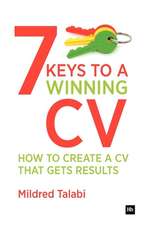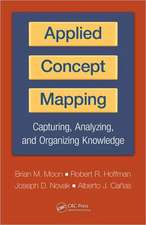Information Technology and Organizational Learning: Managing Behavioral Change in the Digital Age
Autor Arthur M. Langeren Limba Engleză Paperback – 11 oct 2017
| Toate formatele și edițiile | Preț | Express |
|---|---|---|
| Paperback (3) | 318.72 lei 3-5 săpt. | +20.64 lei 5-11 zile |
| CRC Press – 16 noi 2023 | 318.72 lei 3-5 săpt. | +20.64 lei 5-11 zile |
| CRC Press – 31 oct 2010 | 430.09 lei 6-8 săpt. | |
| CRC Press – 11 oct 2017 | 594.56 lei 6-8 săpt. | |
| Hardback (2) | 825.51 lei 6-8 săpt. | |
| CRC Press – 16 noi 2023 | 825.51 lei 6-8 săpt. | |
| CRC Press – 19 oct 2017 | 842.46 lei 6-8 săpt. |
Preț: 594.56 lei
Preț vechi: 743.20 lei
-20% Nou
Puncte Express: 892
Preț estimativ în valută:
113.78€ • 118.07$ • 95.10£
113.78€ • 118.07$ • 95.10£
Carte tipărită la comandă
Livrare economică 17-31 martie
Preluare comenzi: 021 569.72.76
Specificații
ISBN-13: 9781498775755
ISBN-10: 1498775756
Pagini: 429
Ilustrații: 60 Line drawings, black and white; 7 Halftones, black and white; 26 Tables, black and white; 71 Illustrations, black and white
Dimensiuni: 156 x 234 x 23 mm
Greutate: 0.59 kg
Ediția:3rd edition
Editura: CRC Press
Colecția CRC Press
ISBN-10: 1498775756
Pagini: 429
Ilustrații: 60 Line drawings, black and white; 7 Halftones, black and white; 26 Tables, black and white; 71 Illustrations, black and white
Dimensiuni: 156 x 234 x 23 mm
Greutate: 0.59 kg
Ediția:3rd edition
Editura: CRC Press
Colecția CRC Press
Cuprins
The "Ravell" Corporation. The IT Dilemma. Technology as a Variable and Responsive Organizational Dynamism. Organizational Learning Theories and Technology. Managing Organizational Learning and Technology. Organizational Transformation and the Balanced Scorecard. Virtual Teams and Outsourcing. Digital Transformation and Changes in Consumer Behavior. Forming a Cyber Security Culture. Integrating Generation Y Employees to Accelerate Competitive Advantage. Synergistic Union of IT and Organizational Learning. Toward Best Practices. Conclusions.
Descriere
Focusing on the critical role IT plays in organizational development, the book shows how to employ action learning to improve the competitiveness of an organization.
Notă biografică
Arthur M. Langer, EdD, is Associate Vice-Provost and Director of the Center for Technology Management and Digital Leadership and professor of professional practice at the D’Amore-Mckim School of Business at Northeastern University. He was the inaugural Director of the Center of Technology Management and professor of practice of Technology Management at Columbia University. At Columbia he was also the academic director of the Executive Masters of Science program in Technology Management, vice chair of faculty and executive advisor to the dean at the School of Professional Studies and remains on the faculty of the Department of Organization and Leadership at the Graduate School of Education (Teachers College). He also served as a member of the Columbia University Faculty Senate. Dr. Langer is the author of The Path to Data Dominance: Forming a Digital Strategy to Drive Revenue Growth (2023 with Arka Mukherjee); Analysis and Design of Next-Generation Software Architectures: 5G, IoT, Blockchain, and Quantum Computing (2020), Guide to Software Development: Designing & Managing the Life Cycle. 2nd Edition (2016), Strategic IT: Best Practices for Managers and Executives (2013 with Lyle Yorks), Information Technology and Organizational Learning (2011), Analysis and Design of Information Systems (2007), Applied Ecommerce (2002), and The Art of Analysis (1997), and has numerous published articles and papers, relating to digital transformation, service learning for underserved populations, IT organizational integration, mentoring, and staff development. Dr. Langer consults with corporations and universities on information technology, cyber security, staff development, management transformation, and curriculum development around the Globe. Dr. Langer is also the chairman and founder of Workforce Opportunity Services (www.wforce.org), a non-profit social venture that provides scholarships and careers to underserved populations around the world.
Dr. Langer earned a BA in computer science, an MBA in accounting/finance, and a Doctorate of Education from Columbia University.
Dr. Langer earned a BA in computer science, an MBA in accounting/finance, and a Doctorate of Education from Columbia University.
Recenzii
Langer shows us through compelling case studies and the use of research findings what organizational learning looks like when it is happening and the processes and culture necessary to support it. ... a book for and about leadership ... draws on core knowledge about leading change, business strategy, and organizational design. It provides a view of the executive role in managing organizational transformation that is relevant not only to the chief information officer but also to every occupant of the C-Suite [the offices designated for those executives whose title starts with "Chief," such as chief executive officer (CEO), chief operating officer (COO), etc.].
—David A. Thomas, H. Naylor Fitzhugh Professor of Business Administration, Harvard Business School
A must read for any technology leader.
—J. Chris Scalet, Executive Vice President Global Services & Chief Information Officer (CIO) Merck & Co., Inc.
Langer provides a comprehensive analysis of how information technology continues to dramatically change organizational life. His theories and applications of the strategic and cultural uses of technology are fundamental to understanding the principles and concepts of organization design in the 21st century.
—Charles C. Snow, Mellon Foundation Professor of Business Administration, Smeal College of Business, Penn State University
—David A. Thomas, H. Naylor Fitzhugh Professor of Business Administration, Harvard Business School
A must read for any technology leader.
—J. Chris Scalet, Executive Vice President Global Services & Chief Information Officer (CIO) Merck & Co., Inc.
Langer provides a comprehensive analysis of how information technology continues to dramatically change organizational life. His theories and applications of the strategic and cultural uses of technology are fundamental to understanding the principles and concepts of organization design in the 21st century.
—Charles C. Snow, Mellon Foundation Professor of Business Administration, Smeal College of Business, Penn State University













